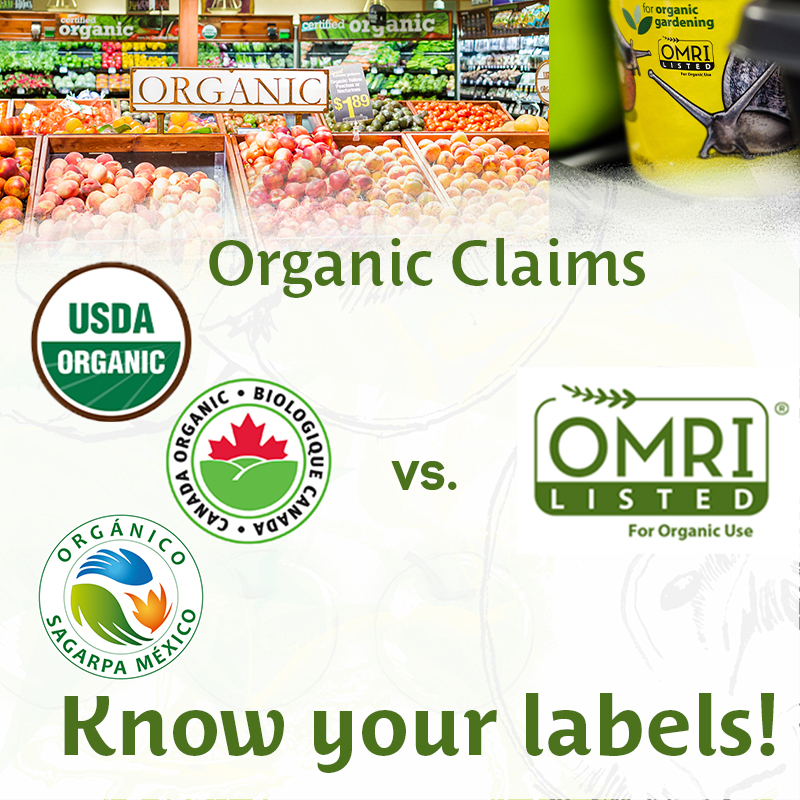Organic Claims
 Clarifying when organic claims fall under OMRI’s scope of review
Clarifying when organic claims fall under OMRI’s scope of review
By Kelsey McKee
The USDA organic seal is widely recognized in the grocery aisle and wider marketplace. To uphold the integrity of the seal, the National Organic Program (NOP) Compliance and Enforcement division investigates complaints and may issue civil penalties when organic claims are made in violation of the organic regulations. This oversight gives consumers confidence that food labeled as “organic” has been grown in accordance with the regulations, using organic management practices and allowed inputs.
The scope of organic certification encompasses agricultural materials intended for human or livestock consumption, but it does not extend to other types of materials. For example, the NOP does not have the same authority to enforce organic claims on input materials, because most inputs fall outside the scope of organic certification. So what does “organic” mean when it is used on a product like a fertilizer or sanitizer?
The answer is complex. The term “organic” may be regulated by different state and/or federal agencies, and acceptable organic claims vary widely depending on the type of input, where it is sold, and how it is used. For example, the Environmental Protection Agency (EPA) has authority to approve or deny use of the term “organic” when it appears on a pesticide label within the U.S., and many state fertilizer boards enforce organic claims on soil amendments sold domestically. Additionally, the Association of American Plant Food Control Officials (AAPFCO) defines organic fertilizer as “a material containing carbon and one or more elements other than hydrogen and oxygen essential for plant growth,” giving the term an entirely different meaning when it appears on a nutritive fertilizer for plants as opposed to a snack food for people. The EPA and AAPFCO examples demonstrate some of the regulatory complexity around organic input claims in the U.S., and additional labeling regulations may apply to inputs sold internationally.
Apart from the regulatory definitions, the term “organic” is also used as a marketing claim on input products that are intended for organic production, even if they fall outside of the scope of organic certification and are outside the jurisdiction of other authorities that regulate organic claims.
OMRI’s review is focused on compliance with the organic standards, so OMRI’s enforcement of the term “organic” is limited to claims that fall under the scope of the NOP or Canada Organic Regime (COR) regulations. This means that OMRI will not list a product that makes certified organic claims (i.e., labeling that claims “certified organic,” “USDA organic,” or “Canada organic”) or displays the corresponding seal if the final product is not itself certified to the applicable standard. Likewise, OMRI will not list a product that makes organic claims in violation of the NOP or COR regulations. In general, this means that agricultural products intended for human or livestock consumption must be certified organic in order to make organic claims. The NOP regulations further define allowed organic claims, and NOP Program Handbook Guidance 4012 provides clarification on company names containing the term organic or variants of the term organic. OMRI utilizes the regulations and available guidance when verifying organic claims on agricultural products intended for livestock or human consumption. For example, a livestock feed ingredient composed of certified organic agricultural ingredients may use the term “organic” within the ingredient statement; however, organic claims may not appear elsewhere on the product label unless the final product is certified organic. As another example, a kelp product intended for use as a livestock feed ingredient must be certified organic in order for the term “organic” to appear on the primary display panel, even if the term appears only within the brand or company name.
Other organic claims that fall outside the scope of the regulations are not enforced by OMRI, including claims on nonagricultural livestock feed ingredients (e.g., a mined mineral or synthetic micronutrient) and labels using “organic” in the product name for a fertilizer. For example, kelp is a common ingredient in fertilizer, but because fertilizers are outside the scope of the organic regulations, organic claims are not enforced. Such organic claims may refer to the carbon-based ingredients, the natural source from which the product was derived, or may constitute an unverified claim that an ingredient is certified organic.
Because all of these different considerations can lead to confusion when it comes to understanding organic claims, OMRI recommends specific terminology when the word organic appears on the label of an input intended for use in organic production. The phrases “for organic use” and “for organic production” clearly communicate how a product is intended to be used, without implying that the product is itself certified organic.
This article originally appeared in the summer 2018 edition of the OMRI Materials Review newsletter, and was reviewed and updated by Technical Director Doug Currier in April 2020.








